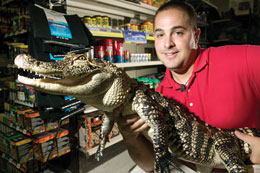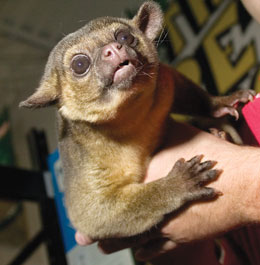From alligators to zebras: Insuring exotic animals
Careful handling and solid insurance coverage keep odd pets and their owners happy
By Phil Zinkewicz
Tony Weber, owner of a pet store in Carmel, Indiana, and Mitchel Kalmanson, owner of an insurance agency in Maitland, Florida, are about as different as two men can be.
Weber is a soft-spoken, easygoing Midwesterner with a broad smile and a Jimmy Stewart-Henry Fonda “Oh, my gosh” approach toward his work. In addition, his work is also his primary hobby. On the other hand, Kalmanson’s speech pattern is rapid fire, reminiscent of Robert Preston’s “Trouble in River City” number in The Music Man. Kalmanson’s hobbies include polo, scuba diving, fishing, yachting and horseback riding. His work as an agent and a U.S. correspondent for Lloyd’s of London has taken him throughout the United States, Europe, South Africa, Zimbabwe, Brazil, parts of Asia, South and Central America, the Bahamas and the Caribbean islands.
However, both men have one very unusual trait in common. Their lives, as well as their livelihoods, revolve around exotic animals—skunks, alligators, llamas, snakes, zebras and kinkajous, to name just a few.
Let’s begin with Weber. He owns Pet Jungle, an exotic pet store in Carmel, where he sells birds, reptiles and mammals. His pet skunk, Trouble, weighing in at about 12 pounds, provided the impetus for Weber’s current occupation. He bought Trouble from a pet store and soon realized the special care that exotic animals need. So he opened his own pet store, his mission being not only to make a living but also to make a difference in the lives of the animals he sells.
“We don’t sell ‘lives’ on commission,” says Weber. “We don’t sell our animals to people who just want them for a short time as a novelty and then proceed to get rid of them. Our store is education based. If you treat an animal well—whether it’s a skunk, snake, turtle or kinkajou— it will be a very rewarding experience. If you water the animal, feed it properly and show affection, the boa constrictor will not squeeze and the tarantula will not bite.”
In Trouble’s case, feeding is not a simple task. Once a day, Trouble is fed a concoction of mixed vegetables, powdered milk, a multivitamin, cottage cheese and yogurt. The skunk lives at Weber’s home with Weber and his wife, her two cats, his 75-pound Lab-shepherd mix, their snakes, turtles and fresh- and saltwater fish.
In his shop, Weber has what he calls “the normal stuff” such as hamsters, rabbits and guinea pigs. But he also has a Burmese python, two red-tailed boa constrictors, two jungle carpet pythons and an alligator.
“Some of the animals we have we don’t sell,” says Weber. “Gus (the alligator), for example, is not for sale. But we do educational petting zoo-type events, where children can learn about these exotic animals. With educational shows on television, kids today know a good deal more about exotic animals than in the past. They come to our events to see the animals ‘live and in person,’ as they say in show business.”
Weber advises people who are interested in purchasing exotic animals to do their homework first. “Go on the Internet; do research,” he says. “The whole family should discuss the purchase so that everyone knows what will be coming into their home.”
As for insurance coverages, Weber says his wife is an underwriter and that, when they first opened the shop, she warned that insurance would be difficult to obtain. But Weber has not found this to be true. “There are some insurance companies that will not entertain this kind of operation, but there are others that will.”
Animal-loving agent
That takes us to Kalmanson. Also an animal lover, he is president of Lester Kalmanson Agency, Inc., in Maitland, Florida. He describes himself as a “farm kid” whose father was in the insurance business. As an adult, he combined his passion for animals with his father’s business and began to build a career. Kalmanson’s Web site says he can provide specialty insurance coverage for animals from alligators to zebras. “Although we offer a wide range of general insurance options, we’ve made our reputation by providing insurance for the wild, weird and wacky,” says Kalmanson. “More specifically, we offer insurance to customers who would have a hard time getting coverage from anywhere else,” he says.
Kalmanson’s agency arranges coverage for canine liability, pedicab liability (that means rickshaws where the “animal” being insured is a human one), spectator liability, circus liability, animal entertainment and animal mortality. He also serves as a consultant and expert witness.
“I am not only involved in the insuring of exotic animals, but I am also responsible for their transport,” says Kalmanson. “Some of these animals are worth a good deal of money. I have to make certain they’ll arrive alive and in good health. There is the flying time to consider, whether the surrounding area should be iced, how and when to administer antibiotics prior to the flight to ward off germs. The animals have to be properly caged, with strong locks. Sometimes I even take a vet with me to attend to the animals prior to and after the flight.”
Kalmanson’s expertise in the area of exotic animals has brought him wide attention in the judicial and regulatory arenas, where he has often been called as an expert witness. Some examples are:
• He was retained as an expert by the USDA in Miami to give written testimony on the value of various primates.
• Was retained by certain underwriters at Lloyd’s of London as an expert on mobilization valuation shipping of various domestic and exotic animals.
• Was retained by counsel as an expert witness for a case in Texas involving the sale of two emus of the same sex, when the sale was supposed to be two emus of the opposite sex. He testified on the proper methods of sexing, vegetarian exams conducted and the values of the species involved with the sale.
• Was hired as an expert on valuation of a written certification of appraisal of various frozen zoological specimens such as reptiles and amphibians for Great Lakes Zoological Supply, Inc.
• Provided expert testimony for the valuation of a male llama for a homeowners insurance claim where an insured’s dog attacked and killed a neighbor’s llama.
• Was a guest speaker at a closed meeting of elephant owners, trainers and handlers throughout the United States
And the list of Kalmanson’s travels and accomplishments goes on: inspecting Atlantic bottlenose dolphins for underwriting purposes, participating in the 1996 Giant Panda Team responsible for the shipment of pandas from Shanghai to the San Diego Zoo, attending an artificial insemination of elephants in Vienna.
Do your homework
The point is, Kalmanson says, that as an agent you can insure any kind of exotic animal if you do your homework regarding the animal’s care and feeding, and if you practice sound loss prevention and risk management techniques to ensure the animal’s safety and the safety of those around the animal.
The same holds true, he says, in insuring not-so-exotic animals like your average canine.
“Many types of dogs have been classified as dangerous breeds,” he says. “These breeds, usually larger dogs, receive high-profile media coverage and are blamed for most dog bite attacks in the country. As a result, many homeowners associations put restrictions on certain dog breeds, and some municipalities have gone as far as to ban specific breeds. At the very least, a growing number of communities demand that owners of these so-called ‘dangerous breeds’ invest in liability insurance for their animal.
“The problem is that most carriers of homeowners insurance won’t cover dogs on the ‘blacklist.’ At my agency,” Kalmanson continues, “we don’t judge a dog by its breed. We judge a dog by its history. That means we understand that it’s not the breed that determines whether a dog is likely to attack, but rather its circumstance and training. Therefore, we gladly provide liability insurance to owners of all breeds of dogs. Even if a dog does have a less than perfect history, we have insurance options.”
In that regard, Weber and Kalmanson are very much alike. Aggressiveness in an animal—any animal—is usually a response on the part of the animal to having been treated aggressively, they say. In other words, take care of your kinkajou and your kinkajou will take care of you. * |
|
Click on image for enlargement |
 |
| |
“If you water the animal, feed it properly and show affection, the boa constrictor will not squeeze and the tarantula will not bite.”
—Tony Weber
Owner, Pet Jungle
Carmel, Indiana |
| |
 |
| |
The little critter grasping Tony’s hand is a kinkajou. Also called a “honey bear,” this member of the raccoon family is native to Central America and parts of South America, living in the upper canopy of tropical forests. |
|


